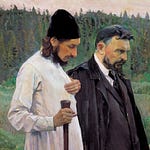Welcome to the first episode of Ask Me Anything. Two subscribers chose to participate. This seems like a low number, but I will take it as a compliment: my posts must be so exhaustive and so well-articulated that they leave no stone unturned and no question unanswered. Nonetheless, I will keep this project going for a while, in case more subscribers choose to participate.
Question 1: Consider a series of reflections on the wedding service(s)? Maybe some reflections on the different blessings of water.
Father Job, these are certainly very important topics, and I may consider them in the future. For now, I am more focused on fasting and prayer - the two regular practices of Christian living. These are certainly not exclusive, and there are others: alms-giving, liturgical services, the study of Scripture and the lives of the saints who came before us, and many others. Yet, attempting to write about too many things would inevitably lead to shallow explorations. I will continue to think about the topics that you brought up, but for now, may I recommend the following two posts:
On the sacramental nature of marriage
-
Question 2: Is it possible to replace all private prayers done at home with only the Jesus Prayer? This presupposes, of course, that the person doing so is attending the divine services and participating in the holy sacraments of the Church whenever possible.
Thank you for this question. The short answer is: all things are possible, only believe. The longer answer can be only in general terms, without taking into account any individual-specific situations. Here are some ways to think about this issue.
Firstly, what are the “private prayers” that you would wish to replace? If it is the morning and evening prayers found in the various editions of prayer books, then consider this: these prayer books appear sometime in the 17th century and do not enter into wide usage until much later. In other words, in terms of the history of Orthodoxy, modern prayer books are in innovation. This is not to say that various prayers did not circulate among Christians since at least the fourth century - they did. But there never was the idea that a certain set of such prayers was obligatory for the laity. (Monastics are a slightly different story.) In fact, there still is no ruling or canon mandating that a specific set of prayers be used in daily recitations - only pious advice from well-meaning pastors. The prayer books themselves have gone through several editions with varying numbers of prayers, and they continue to evolve.
Secondly, the only prayer rule for lay people that is expressly obligatory comes from a late-first-early-second-century document called the Didache. This document contains several rules which may have been observed in the early Church - at least, in some of her parts - but this document’s role in the present-day Church is more historical, rather than truly canonical. In any case, the prayer rule contained in the Didache, chapter 8, consists of reciting the Lord’s Prayer (“Our Father”) three times daily. If I were to offer any advice on this matter, I would suggest that it would be good to keep this rule. The Lord’s Prayer is given to us directly by Christ: “After this manner therefore pray ye…” (Matt. 6:9), and if we are to keep any rule at all, it seems that we should keep this one.
Thirdly, perhaps equally as ancient as the Didache, there is a practice of using psalms as a form of daily prayer. Early monastics used psalms almost exclusively. In the collaboration between the composers of liturgical services and the early monastics was created a synthesis, whereby the liturgical services of the Church contain a lot of material from psalms, and some of the services, such as the hours, essentially consist of psalms. Thus, psalms are a very ancient form of daily prayer pre-dating modern-style prayer books by at least a millennium, and it may be beneficial to incorporate this practice into one’s prayer rule. There also exists a practice of replacing the daily cycle of services with a specific number of psalms.
Fourthly and finally, since approximately the Middle Ages, the normative daily prayers consisted of what we now consider to be church services: vespers, compline, the midnight office, hours, etc. Naturally, this practice was accessible primarily to the educated elites. Illiterate people - whether elites or peasants - and people who could not afford to acquire the necessary manuscripts would have the option of listening to some of the services in church, if they were able to attend. To be sure, this would have been inconvenient or even impossible for some people, which fact led to the need to create other options for daily prayer.
One 17th-century document by monk Dorotheus titled The Flower Garden written for monastic use, does propose that those who are illiterate replace the daily cycle of services with the Jesus Prayer: 600 prayers for a compline, 1500 for matins, 1500 for the hours, and so on (see ch. 56). The entire daily cycle of prayers would amount to 9000 Jesus Prayers. Interestingly, if the Jesus Prayer is recited with bows or prostrations, rather than sitting down, the numbers are cut in half. (One must be of a rather robust constitution in order to accomplish 4500 prostrations daily.) The numbers themselves are not very important, but the principle of using the Jesus Prayer in place of other prayers certainly exists. This practice was primarily developed for monks, many of whom were illiterate, but lay people began using a modified version of this rule as well. However, all versions of such practices also included the Lord’s Prayer.
Thus, to answer your question, it certainly is possible to use the Jesus Prayer in place of the daily prayer rule, especially if one has no access to the books needed for daily prayers (usually, literacy is not the main problem for most people nowadays). But there are other options for those for whatever reason dissatisfied with modern prayer books: using psalms as a form of daily prayer and, importantly, using daily services - compline in the evening, midnight office in the morning, and hours throughout the day.
Last but not least, this is a reader-supported publication; please share it with your friends and family! And if you would like access to all our posts, please consider becoming a paid subscriber - it is only $5 per month ($4 if you subscribe for a year); a copy of The Flower Garden will cost you much more than that.













Share this post